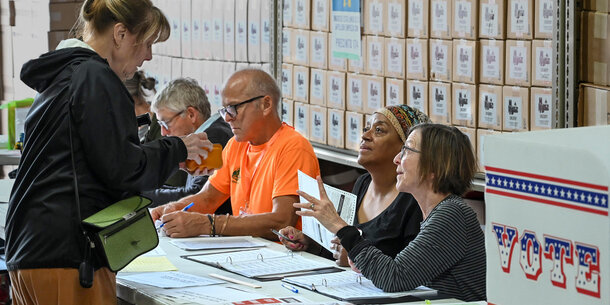Microsoft released a report this month detailing efforts by Iran, Russia, and China to influence American voters ahead of the November election, divide the country, and even incite violence. The report describes a recent Iranian phishing attack targeting a presidential campaign. The day after its publication, former President Trump’s campaign cited the report when announcing that its internal communications had been hacked. Days later, Vice President Harris’s campaign disclosed that the FBI had notified it of a foreign influence operation targeting the campaign. Both announcements deservedly received ample media coverage.
In the midst of that coverage, however, the big-picture warnings from the Microsoft report may have been lost. The Iranian attack is but one of a range of large-scale efforts by foreign adversaries — specifically, Iran, Russia, and China — to amplify divisions within the United States and decrease Americans’ confidence in our democracy.
Efforts by actors linked to Iran include creating fake news websites containing incendiary messaging about polarizing topics, such as LGTBQ rights and the Israel-Hamas conflict. One site targets liberal audiences by mocking Trump. Another caters to conservatives, writing about Republican politics and critiques of gender-affirming care. Another actor with ties to Iran has employed tactics including impersonating activist groups to sow division and undermine confidence in government officials.
The report also details recent malign influence operations by Russia. One prominent actor uses video forgeries and fake journalist accounts to peddle false claims that are then bolstered on artificial news websites. These claims have often focused on decreasing trust in key government institutions, including conspiracies that the CIA and FBI are working to disrupt the election and spy on Trump.
Finally, Microsoft reports that China, Russia’s most important ally, is also working to amplify discord ahead of the 2024 election. In the spring, hundreds of fake accounts linked to China posted in support of pro-Palestine protests on U.S. college campuses and offered directions to nearby demonstrations. Another Chinese influence actor has released videos criticizing President Biden.
These findings are echoed in last month’s election security update from the Office of the Director of National Intelligence, which highlighted, among other things, Russian plans to sway public opinion in swing states and Iranian actors’ efforts to undermine confidence in U.S. institutions and fan existing tensions about the Israel-Hamas conflict.
While Microsoft’s report doesn’t mention specific attacks against election infrastructure, these same adversaries have a history of targeting election infrastructure with cyberattacks and disinformation campaigns meant to cast doubt on election security.
In 2022, pro-Russian “hacktivists” temporarily restricted access to a state election office website. Previously, Russia and Iran targeted several networks that manage election-related functions in 2020, while in 2016, Russia targeted both state systems and private election system vendors. Importantly, none of these efforts ultimately interfered with the voting process or materially affected the security of any election infrastructure, but they have been used by foreign and domestic actors to call into question the trustworthiness of elections.
These same adversaries have carried out disinformation campaigns about the security of American election infrastructure. For instance, in the days leading up to the November 2022 midterm elections, Iranian operatives fabricated a video depicting an Iranian “whistleblower” hacking into a U.S. voter registration database. Russia has also focused on casting doubt on election integrity in recent years, including by spreading false information that President Biden lost the 2020 election as part of its strategy to undermine confidence in democracy.
These warnings from Microsoft underline how important it will be over the next several weeks for election officials and the media to highlight the greatly improved security of our election infrastructure in recent years. In particular, jurisdictions nationwide have increased the use of paper ballots, which cannot be hacked and are routinely audited after the election to confirm vote totals. This year, only about 1.4 percent of all votes will lack a paper backup, down significantly from nearly a quarter of all votes in 2016. Election officials in every swing state, and most other states, will audit those paper records to confirm the accuracy of the vote count.
In light of these attempts to influence voters of various political backgrounds, it is more critical than ever for the public to know where to find accurate voting information. When it comes to elections, election officials are the most authoritative source of information. Voters can turn to local and state election offices, including government websites, to ensure they have accurate information about how, when, and where to vote, as well as other important information about how elections work in their jurisdictions. Americans must also think critically about the information they consume and prioritize sources from legitimate news organizations with trained journalists and an editorial review process.




